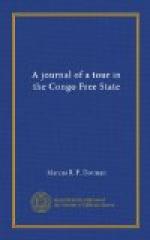Suddenly shrieks are heard coming from a hut and we order the sentry to discover the cause. He soon appears with one of our paddlers, who states that another one stole his ration, and when he endeavoured to get it back, beat him severely. We order him therefore more food, and decide to investigate the case in the morning.
Next day after giving cloth to the Chiefs in payment for the food, we send for the youth who made so much noise in the night. A poleman now stated that the boy had stolen his loin cloth and that therefore he had beaten him. This story contradicted the other and further native evidence complicated the story still more, so after explaining to the poleman that he had no right to beat the boy, even if he were one of his crew, and that if such a thing occurred again, he would be severely punished, we decided to take no further action.
One of the French soldiers now appeared and told a romantic story. He had found a long lost blood sister in the village, the mutual recognition being confirmed by the tribal marks. Both had been sold as slaves when children; he had drifted into the French native army and she had married one of the subjects of the State. Now she wished to leave her husband and go away with her brother, who was willing to pay compensation for her loss if necessary. As this seemed to raise some delicate questions, we refused to take any step, except to report the matter to the proper authorities.
After these delays, we started up the river, lined on both sides by thickly populated villages. About midday an excited crowd stopped us at one of these and asked for our help. As everyone shouted at once and probably no one told the truth, it was difficult to discover what was the matter, but some women were missing from the French Congo and an elephant from the State, and the natives on each bank wished the white men to punish those on the other. As private travellers, of course we could take no action, even if we had wished, and continued on our way already two or three hours late. At length at 6 p.m., Zinga is reached, a large village with a fine plantation, and here we camp.
Just above the village the rapids are so strong that it is dangerous to take the canoes up charged, and it is necessary to carry all the baggage for about three miles across country until smooth water is reached again. The capitas wished to attempt the ascent with the canoes full, for the native dislikes carrying, more than anything else. We explain that if it is necessary for the white men, who can swim, to walk, how much more necessary is it to carry the baggage, which would at once sink if the canoes capsized. However, this did not convince them and Europeans who have had accidents on the river say, that although the whole crew, who all swim like fishes, go to the assistance of the white man when a canoe capsizes, not one will take the trouble to rescue the baggage. Probably the native, whose personal property is limited




